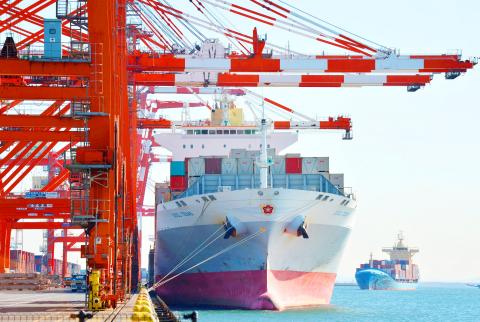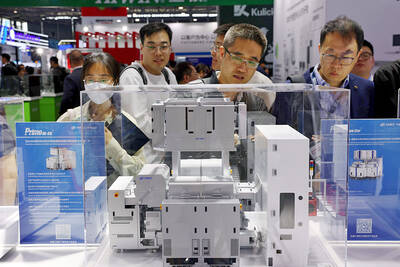Japan logged its fourth straight monthly trade deficit last month as the European debt crisis and strained business ties with China over a territorial dispute reduced exports.
The Japanese Ministry of Finance said yesterday that imports exceeded exports by ¥549 billion (US$6.7 billion), the biggest deficit for last month since at least 1979, when the ministry began keeping comparable records.
Exports for the month fell 6.5 percent from a year earlier to ¥5.150 trillion, while imports slipped 1.6 percent to ¥5.699 trillion.

Photo: AFP
For years, Japan ran huge trade surpluses, which frequently caused trade friction with the US.
However, since last year, Japan has been regularly registering trade deficits as it shifts more production overseas and faces greater competition from Asian rivals such as Taiwan, South Korea and China.
The strong yen as also made it expensive for Japan’s major automobile and electronics makers to produce at home.
This year, Japan has registered trade deficits every month except February and June.
Japan’s trade balance has also been affected by increased imports of fuel to offset the shutdown of nearly all its nuclear plants in the wake of last year’s atomic disaster in Fukushima.
However, last month, imports of petroleum fell 24.5 percent, while imports of liquid natural gas rose 8.3 percent and coal increased 5 percent.
Last month, exports to Western Europe plunged 23.5 percent to ¥527 billion, while exports to China dropped 11.6 percent to ¥948 billion, ministry statistics showed.
Exports of cars, TVs and audio-visual equipment were particularly down.
A spat with China over disputed islands in the East China Sea that are controlled by Japan, but also claimed by Taiwan and China, led to anti-Japanese riots in September and boycotts of Japanese products in China.
Automakers such as Toyota Motor Corp have suffered a sharp drop in sales in China.
Total automobile exports fell 12.4 percent to 486,111 vehicles. Car exports to China tumbled 82 percent, while exports of video equipment to China also declined.

SEMICONDUCTOR SERVICES: A company executive said that Taiwanese firms must think about how to participate in global supply chains and lift their competitiveness Taiwan Semiconductor Manufacturing Co (TSMC, 台積電) yesterday said it expects to launch its first multifunctional service center in Pingtung County in the middle of 2027, in a bid to foster a resilient high-tech facility construction ecosystem. TSMC broached the idea of creating a center two or three years ago when it started building new manufacturing capacity in the US and Japan, the company said. The center, dubbed an “ecosystem park,” would assist local manufacturing facility construction partners to upgrade their capabilities and secure more deals from other global chipmakers such as Intel Corp, Micron Technology Inc and Infineon Technologies AG, TSMC said. It

EXPORT GROWTH: The AI boom has shortened chip cycles to just one year, putting pressure on chipmakers to accelerate development and expand packaging capacity Developing a localized supply chain for advanced packaging equipment is critical for keeping pace with customers’ increasingly shrinking time-to-market cycles for new artificial intelligence (AI) chips, Taiwan Semiconductor Manufacturing Co (TSMC, 台積電) said yesterday. Spurred on by the AI revolution, customers are accelerating product upgrades to nearly every year, compared with the two to three-year development cadence in the past, TSMC vice president of advanced packaging technology and service Jun He (何軍) said at a 3D IC Global Summit organized by SEMI in Taipei. These shortened cycles put heavy pressure on chipmakers, as the entire process — from chip design to mass

Germany is to establish its first-ever national pavilion at Semicon Taiwan, which starts tomorrow in Taipei, as the country looks to raise its profile and deepen semiconductor ties with Taiwan as global chip demand accelerates. Martin Mayer, a semiconductor investment expert at Germany Trade & Invest (GTAI), Germany’s international economic promotion agency, said before leaving for Taiwan that the nation is a crucial partner in developing Germany’s semiconductor ecosystem. Germany’s debut at the international semiconductor exhibition in Taipei aims to “show presence” and signal its commitment to semiconductors, while building trust with Taiwanese companies, government and industry associations, he said. “The best outcome

Semiconductor equipment billings in Taiwan are expected to double this year, as manufacturers in the industry are keen to expand production to meet strong global demand for artificial intelligence applications, according to SEMI, which represents companies in the electronics manufacturing and design supply chain. Speaking at a news conference before the opening of Semicon Taiwan trade show tomorrow, SEMI director of industry research and statistics Clark Tseng (曾瑞榆) said semiconductor equipment billings in Taiwan are expected to grow by an annual 100 percent this year, beating an earlier estimate of 70 percent growth. He said that Taiwan received a boost from a